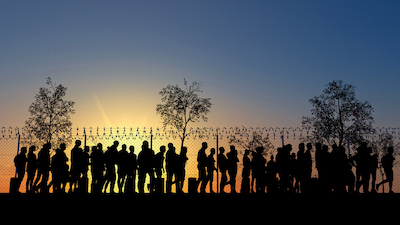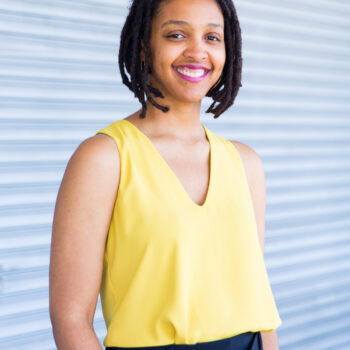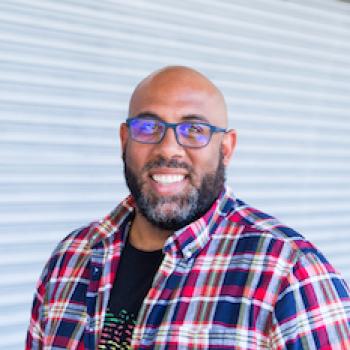In this episode of Raci$m Is Profitable, Greisa Martínez Rosas of United We Dream joins Solana Rice and Jeremie Greer to talk about citizenship. They lift the curtain on why US citizenship is denied to so many and why it has yet to be fully realized for most Americans. You can listen to the full episode here, or read an edited transcript below.
Jeremie Greer: We’re homing in on the idea of citizenship as a piece of our economic system, our political system. What is citizenship to you? What does it mean to be a citizen.
Greisa Martínez Rosas: As I was growing up, citizenship always felt like this fairyland made with unicorns; it meant having healthcare, a stable job, and a better life. It was sold to us in that way. I grew up in this mixed status households: two of my sisters are US citizens; myself and my younger sister are undocumented. And we saw what it meant. They got to go to the doctors, and my little sister and I stayed home. They got to go to Mexico and meet our grandmother, and my little sister and I stayed home. So growing up, citizenship meant access to something and connection to something. I still remember when we first came to the US. I was seven and my youngest sister and I, we crossed the Rio Grande with my parents, and my other two sisters rode through the checkpoint. Citizenship was something that I deeply yearned for that meant safety.
But now that I have come of age in this nation, it’s actually a form of political oppression for a lot of us. In Spanish, we say this word like I say “espejismo” — this mirage that everyone is the same, but we know that’s not true, even for children of immigrants that are US citizens, Black people, women; it’s this elusive thing. I’m not gonna lie, I still want to be able to go back and visit my father. I want to have access to health care and all of those things. And the beauty of this moment is like, I also know that it’s not an end all be all, and it is part of my job to make sure that it’s not used as a dividing line between people that could very well be connected in the shared struggle.
Solana Rice: How do we broaden this definition of who belongs in this nation?
Martínez Rosas: Oftentimes, people think about victories or breakthroughs — like these big moments at the Supreme Court. But the expansion of who is really a citizen, it happens in these minuscule moments, every single day. We saw the death of Brianna Taylor and George Floyd, and the way in which the system failed them. Even though they had Social Security Numbers, they were not protected by their citizenry. For me, it means being able to care for one another, being able to have a voice in civic life and an ability to self-determine, to have dignity in their work, dignity in their everyday lives.
Greer: Can we get to a place of inclusive citizenship?
Martínez Rosas: There is a human nature part of feeling like there’s not enough. I know the pain of those migrants that are coming and [even I think] maybe there won’t be enough for me in this country that’s already oppressing me this much. But that is a lie. It is a lie that upholds white supremacy and white nationalism and that keeps Bezos and all those people making billions of dollars every single year.
Greer: There’s big things happening at United We Dream.
Martínez Rosas: We are building a broad multiracial movement of young people that are fighting for the rights of everyone to live free and be able to thrive. And so what that looks like in this coming year is defining what our united front looks like, who are our allies that will walk hand in hand. We’re doing story circles with Indigenous undocumented people about what are the connections that ground us in this work. We’re also looking forward to the midterms because we do believe that we cannot let ourselves be guided by the politics of now. We have to create the politics of tomorrow, which means that we have to intervene right now. So young people are getting ready to elect the people that they’re that they truly believe will represent them.


